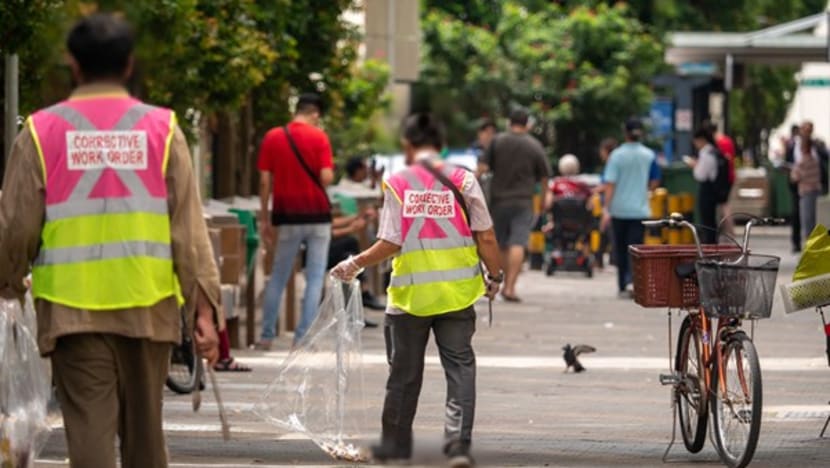Singapore may publicise images of litterbugs to catch offenders
"Care will be exercised" in cases committed by young children, the elderly or vulnerable groups, says the National Environment Agency.
Offenders carrying out a corrective work order session in Singapore. (Photo: Facebook/NEA)
04 Mar 2024 08:07PM (Updated: 04 Mar 2024 08:27PM)
SINGAPORE: In a crackdown on litterbugs, Singapore may publicise images of offenders in community spaces so members of the public can help identify them.
Identified offenders will be dealt with under the law, including being fined or charged in court, the National Environment Agency (NEA) said.
"Care will be exercised" in cases committed by young children, the elderly or vulnerable groups, the agency added.
Feedback on littering has risen 15 per cent from 2022 to 2023, compared with the two years before the pandemic, said Senior Parliament Secretary Baey Yam Keng, while detailing the Ministry of Sustainability and the Environment's spending plans on Monday (Mar 4).
Authorities will increase the number of closed-circuit television deployments by four times to around 1,000 a year to step up surveillance against littering.
The NEA also plans to conduct more, larger scale and higher visibility blitzes at "cleanliness hotspots", from 21 last year to more than 100 this year.
Corrective Work Orders, where recalcitrant offenders are required to clean public areas for at least three hours, will be conducted at hotspots. About 1,600 Corrective Work Orders were issued between 2021 and 2023.
Mr Baey noted that education efforts and campaigns have paid off, and Singaporeans are "generally civic-minded".
"However, we continue to observe some persistent issues, that require us to go beyond just public education," he said.
"This year, we will be working more closely with the community and ramping up our efforts to address persistent pain points ... The pandemic may be over, but Singapore needs a clean environment to be well-prepared to tackle future public health threats."

High-rise littering, progressive wages: What's new in the Environmental Public Health Act

More people caught littering in Singapore last year, over 20,000 tickets issued: NEA report
CLEANING UP DIRTY TOILETS
To crank up other public hygiene standards, Singapore is also setting up a task force to deal with dirty toilets and stepping up controls against pests such as rats.The Public Toilets Taskforce will review ways to improve the cleanliness of public toilets, particularly those at coffee shops and hawker centres.
The move comes after a study last November that found dirty public toilets remain a bugbear despite years of campaigns.
Coffee shop toilets were seen to be as dirty as they were three years ago, although those at hawker centres had improved. The overall perception of public toilets in the study was unfavourable.
Co-chaired by Mr Baey and chairman of the Public Hygiene Council Andrew Khng, the task force will comprise representatives from public sector agencies, town councils, trade associations, non-governmental organisations, academia, professionals, premises managers and industry associations.
The task force will develop measures to improve hygiene standards for all public toilets, including through infrastructure, cleaning and public education.
In 2023, close to 240 public toilet-related enforcement actions were taken against premises owners or managers.
To tackle the growing rat problem, NEA will trial surveillance cameras with thermal detection capabilities in outdoor and back-lane areas.
The data will be used to help premises operators better coordinate cleaning, waste management and rat control measures. It could also be used in investigations against those that do not dispose of waste properly.

Commentary: It’s more than a wee problem if coffee shop toilets in Singapore are dirty

Increased rat sightings in Singapore due to poor food waste management, wetter weather: Pest busters
REMOVING LICENSING REQUIREMENTS, IMPROVING GRADING FOR FOOD ESTABLISHMENTS
The authorities will also be removing licensing requirements and fees for food establishments selling items with minimal food safety risks.By Jan 1, 2025, all market stalls and vending machines selling non-food items or low-risk food items, such as canned food and packet biscuits, need not be licensed, said Minister for Sustainability and the Environment Grace Fu.
More than half of existing market stall licensees and around two in five existing vending machine licensees will benefit from this new policy, which will "reduce regulatory compliance (requirements) and increase operational efficiency", Ms Fu added.
"The safety of food from these stalls and vending machines will continue to be regulated through standards imposed by (the Singapore Food Agency) on the importers and suppliers of these food items."
The minister also provided an update on the food safety grading system.
The existing grading system grades food establishments based on an annual audit of their food safety performance, but does not adequately reflect whether standards are consistently maintained, said Ms Fu.
The authorities will be moving to a new Safety Assurance for Food Establishments (SAFE) framework that takes into account the establishment's track record and prevailing food safety management systems.
Establishments with poor food safety performance and lower grades will face more frequent inspections and their poor performance could lead to downgrading.
Ms Fu said more details on the framework will be released later this year.


